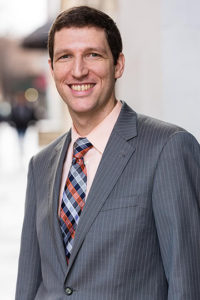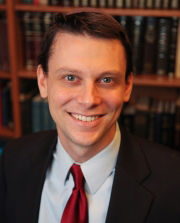Yale’s Slifka Center welcomes not one, but two new leaders who are passionate about the Jewish future
By Stacey Dresner
NEW HAVEN – Uriel Cohen, the new executive director of the Slifka Center for Jewish Life at Yale, fondly remembers the time he spent at Hillel when he was a student at the University of Pennsylvania.
“I went to visit Penn…and absolutely fell in love with Hillel first and Penn second,” he recalls. “It was really the community – the whole feeling of being in a tight-knit Jewish community for the first time in my life. And it was tremendously important – I don’t over-exaggerate in any way when I say that everything that I have accomplished in my professional career is because of what I learned about myself at Penn Hillel.
“It was and continues to be a phenomenal place, though it is about to be eclipsed,” he laughs, referring to the Slifka Center and his plans for the Jewish campus organization.
Cohen comes to Slifka from the City University of New York Queens College Hillel where he was executive director for seven years.
He is joined by Rabbi Jason Rubenstein, who recently became the Slifka Center’s new Howard M. Holtzmann Jewish chaplain.
While Cohen will be the “chief executive” of the center, he and Rubenstein will work together as part of a new leadership model, explains Evan Farber, Slifka board member and head of the search committee.
“Rabbi [James] Ponet ran Yale Hillel for over three decades, in the process literally building the Slifka Center. He was the central figure, and without question an inspiring presence for so many people,” Farber says. “He was the chaplain throughout his tenure, and even when there was a separate executive director, that person functioned more like a COO or CFO reporting to him.”
Rabbi Leah Cohen (no relation), who succeeded Ponet, had backgrounds in both business and rabbinics, and “we kept to that model of having the head rabbi function as the central figure who ran the Center,” Farber says.
During the recent search, the Board had to decide whether to continue with that model or hire separate individuals for the jobs of spiritual leader and executive director. It decided to go with the latter format. The idea is for Cohen to be the overall head of Slifka, with Rabbi Rubenstein working closely with him as part of the leadership team. Cohen will report to the Board and Rubenstein will report to Cohen, who will have control over things like the budget and staffing.
“But the chaplain will also attend Board meetings, will be involved in all visioning discussions, and will serve as the public face of Slifka Center probably about as much as the ED will,” Farber says.
Of course, says Cohen, given it’s early in the game, it remains to be seen precisely how things will work out.
“It’s going to be a work in progress for awhile, but I am very excited. Rabbi Rubenstein is brilliant. I’m really excited to be working with him,” he says.
Meet the Executive Director
 A native of Queens, New York, Uri Cohen grew up in an observant Conservative Jewish home. His father Rabbi Miles Cohen taught at the Jewish Theological Seminary for many years.
A native of Queens, New York, Uri Cohen grew up in an observant Conservative Jewish home. His father Rabbi Miles Cohen taught at the Jewish Theological Seminary for many years.
Though he attended public school and while growing up did not attend a Jewish camp or belong to any Jewish youth groups, he nonetheless sought a tight-knit Jewish community when he was searching for colleges.
“One of the reasons I really wanted to go to Penn was the Jewish studies program,” he says. “The biggest reason I went to Penn was the Hillel, and the opportunity to be involved with a dynamic, vibrant, growing Jewish population with like-minded people. The opportunity to meet a lot of different people was tremendously exciting to me.”
When he had to declare a major at the end of sophomore year, he looked at his transcripts and realized that he had taken most of the courses he needed to be a Jewish studies major. But he also had a work study job in tech support, so he thought he would go into computers. His first job was with Tele-Information – a division of Columbia Business School that studies the telecom sector
“I found out I really don’t care that much about the telecom industry and I realized that I needed to do something that felt like it was really important, in terms of having an impact.”
After a stint at the National Jewish Outreach program, he got a job with Perry Davis Associates, a fundraising consulting firm focusing on non-profits, including many Jewish non-profits.
“That is where I started learning about development,” he says.
While there he started his own non-profit organization, which sounds strikingly familiar.
“It was basically a rip off of the Hillel model but for the post-college age on the Upper West Side. We had Friday night dinners a few times a year with two or three prayer services running parallel that were representative of the Jewish spectrum, and then a communal Shabbat dinner with some kind of educational component. I mean it was a complete and total rip-off of Hillel,” he says.
His group was written up in the Jewish Week.
“I got a call from Hillel International saying, ‘You’ve got to start working for us – you are already running our program,’” he laughs.
He became assistant director of development for Hillel International in New York working on fundraising. He ;ater left Hillel International to become the director of Development at the Solomon Schechter School of Manhattan, doing his graduate work at NYU while working at Schechter. In 2010, he got his MPA in non-profit management at NYU’s Wagner School of Public Service.
“At that point I knew I wanted to be in the Jewish world,” he says. “I knew I wanted to be in the non-profit world and I was pretty sure I wanted to be in Jewish education but I couldn’t narrow it down more than that, except that the one organization I knew I would be happy working for was Hillel.”
After more than four years as development director at the Solomon Schechter School of Manhattan, the Queens College Hillel job opened up and he took it.
He calls that job “an amazing experience.”
When he arrived, Hillel had a budget of $240,000 with a following of only about 300 of the school’s 4,000 Jewish students. During his tenure, he led a major renovations and the number of students active in Hillel increased to 1,300.
Under his leadership, Queens College Hillel was named Hillel International’s Outstanding Campus in 2015. When he left, the campus Hillel boasted eight full-time staffers and a budget of $750,000.
During that period of time, Cohen also became involved with the local community’s large Bukharian Jewish population, a 2,500-year-old civilization of Sephardic Jews from Uzbekistan that began arriving in New York in the 1990s. “There are about 60,000 in [the Queens neighborhoods of] Forest Hills and Rego Park, with 1,000 Bukharian students at Queens College,” Cohen says. “I gathered a bunch of them together and I said who are you and what makes you tick and what keeps you up at night. They said, ‘We are afraid we will be the last generation of Bukharian Jews here.’” He aided in the founding of a Bukharian Culture Club on campus and hired a part-time Bukharian professional to work with Bukharian Jewish students. “I’m sure we are the only Hillel with a Bukharian professional,” he says with a laugh.
Cohen’s track record at Queens College Hillel sealed the deal for Farber and the rest of the search committee.
“Uri won widespread praise and numerous awards for his work at Queens College and was generally recognized as one of the top ‘rising star’ executive directors throughout the Hillel movement,” says Farber. “We are so excited for Uri to bring that skill set and record of accomplishment to Yale.”
Cohen, who lives in White Plains with his wife, Stacey – a clinical informaticist – and their six-year-old son Noah, says he took the position at Yale and the Slifka Center “to steward a campus with one of the best potentials to address the most important issues in the Jewish world today. It was an opportunity I couldn’t resist. … Our predecessor left us a stellar team and I think we can accomplish a huge amount together.”
There are plans to renovate the building’s 25-year-old dining room and kosher kitchen, parts of which, he says, are breaking down and falling apart after more than two decades.
“There is a lot to do to raise the money to design [the kitchen and dining room] and to build a process around it that will result in the best dining arrangement there could be to really support Slifka’s vision, or our vision of what the Center can be within the Yale context,” he said. “Those are things that are going to take longer to figure out.”
Meet the Slifka Center Chaplain
 Before arriving at Slifka, Rabbi Jason Rubenstein was a faculty member of Hadar, a New York-based institute for higher Jewish learning for young adults in their 20s and 30s, as well as its dean of students and alumni.
Before arriving at Slifka, Rabbi Jason Rubenstein was a faculty member of Hadar, a New York-based institute for higher Jewish learning for young adults in their 20s and 30s, as well as its dean of students and alumni.
Quite a few those young adults were graduates of Yale.
“Working in a kind of mentorship role with a diverse group of students who are figuring out how they want to be active, contributing members of the Jewish community feels like the most important work I could be doing.”
Farber says that Rabbi Rubenstein was a leading candidate for the position at Slifka from early on.
“He was a masterful teacher at the Hadar Institute, and among the leadership team there. Many Yalies were among his students – and they sang his praises in such excited tones that we could not help but be excited too,” Farber says. “When we brought him to campus and through the interview process, that excitement was confirmed. Rabbi Rubenstein teaches Torah from a truly pluralistic perspective in a manner that was consistently described to us, and that we experienced ourselves, as brilliant, captivating, sophisticated, and inspiring. …We were lucky to find a rabbi who is an inspiring teacher, has superb pastoral skills, and is eager to engage in both ways – and we’re eager for him to do so.”
In addition to the idea of helping to guide “Yalies” on their Jewish journeys, Rubenstein was attracted to the idea that Slifka and its chaplain “work closely with undergraduates, and also see faculty and the university as a whole; as part of a Jewish life at Yale in a sense that is very broad and very deep.”
A native of Washington, D.C., Rubenstein spent several years studying at Yeshivat Ma’ale Gilboa, a kibbutz in northern Israel that combines Torah study with army service.
He later attended Harvard College where he earned an AB in social studies and then got his masters in Talmud from the Jewish Theological Seminary.
Like Uri Cohen, he found his involvement in Harvard Hillel to be inspirational.
“Hillel was the most formative place for me on campus. I met my future colleagues and my future wife there,” he says. “On a broader level, the relationships I found there, the sense of a way of life that brings together intellectual excitement, the closeness of friendship, the spiritual aliveness of Judaism and a place where all those happen together, is something that can’t really happen at that many other Jewish institutions or any group on campus.
“Providing that kind of holistic seed was Bernie Steinberg, who was executive director at Harvard Hillel at the time I was there and it is what I want to help create for others here,” he adds.
The recipient of numerous awards, including the Wexner Graduate Fellowship and the Covenant Foundation’s 2015 Pomegranate Prize for Emerging Educators, Rubenstein now lives in New Haven with his wife, Arielle, who is finishing her PhD in clinical psychology, and their two sons.
Meeting & Greeting
Slifka’s new leadership team both say they are passionately dedicated to the mission of the Center as well as one of the most important functions of a Hillel leader which, according to Cohen, is “meeting students, one by one by one by one; relationship by relationship by relationship.”
“That is really the building block for setting up a community that is welcoming and representative and where students really feel supported,” says Cohen.









 Southern New England Jewish Ledger
Southern New England Jewish Ledger












